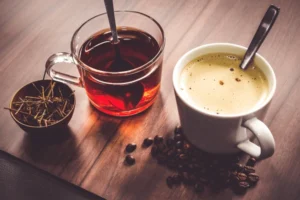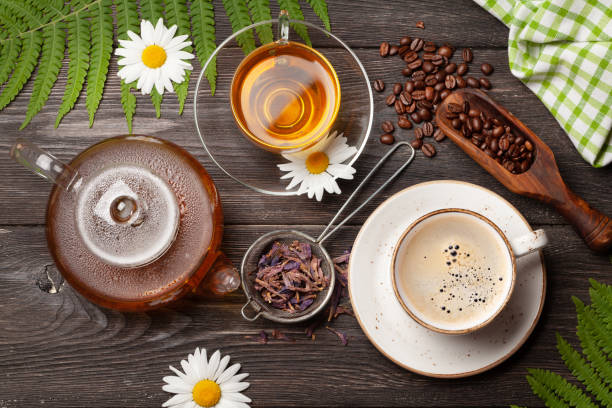For many bodybuilders, caffeine is more than just a morning pick-me-up—it’s a powerful tool for enhancing performance, increasing focus, and aiding recovery. Found abundantly in coffee and tea, caffeine is a natural stimulant that plays a significant role in bodybuilding by providing energy, improving endurance, and even supporting fat loss. Let’s explore how coffee and tea, along with their caffeine content, can become an essential part of your fitness regimen.
The Science Behind Caffeine
Caffeine works by blocking adenosine, a neurotransmitter that promotes relaxation and drowsiness. By doing so, it stimulates the central nervous system, leading to increased alertness, energy, and focus. For bodybuilders, these effects translate into better performance during workouts and improved mental clarity for mind-muscle connection.
Benefits of Caffeine for Bodybuilders
1. Boosts Performance and Energy
Caffeine is a proven ergogenic aid, meaning it enhances physical performance. Consuming caffeine before a workout can:
- Improve endurance and stamina.
- Increase the ability to lift heavier weights.
- Delay the onset of fatigue, allowing for longer and more intense training sessions.
2. Enhances Fat Burning
Caffeine stimulates thermogenesis, the process by which your body burns calories to produce heat. It also promotes the release of stored fat into the bloodstream for energy, making it an excellent addition during cutting phases.
3. Improves Mental Focus
A clear and focused mind is crucial for effective workouts. Caffeine sharpens concentration, helping you maintain proper form and maximize your lifts.
4. Reduces Muscle Pain and Fatigue
Caffeine has been shown to decrease the perception of pain during workouts. This allows bodybuilders to push harder and complete more sets or repetitions.
5. Speeds Up Recovery
Post-workout caffeine consumption, especially when combined with carbohydrates, can aid glycogen replenishment in muscles, accelerating recovery.
 Coffee vs. Tea: Which is Better for Bodybuilders?
Coffee vs. Tea: Which is Better for Bodybuilders?
Coffee
- Contains a higher caffeine content (80–120 mg per cup) compared to tea.
- Provides an instant energy boost, making it ideal as a pre-workout drink.
- Rich in antioxidants that combat oxidative stress from intense training.
Tea
- Offers a milder caffeine dose (20–70 mg per cup) for sustained energy without jitters.
- Green tea, in particular, contains catechins, which enhance fat oxidation and support weight loss.
- Herbal teas like chamomile or peppermint can promote relaxation and recovery.
Best Ways to Incorporate Coffee and Tea Into Your Routine
Pre-Workout Fuel
- Drink black coffee or green tea 30–45 minutes before your workout for a quick energy boost. Avoid adding sugar or high-fat creamers, which can counteract the benefits.
Morning Kickstart
- Start your day with a cup of coffee or tea to stimulate your metabolism and set the tone for a productive day of training.
Fat-Burning Aid
- Include green tea during cutting phases to take advantage of its fat-burning properties.
Post-Workout Recovery
- Pair coffee or tea with a carbohydrate-rich snack after your workout to aid glycogen replenishment.
How Much Caffeine is Too Much?
While caffeine offers numerous benefits, overconsumption can lead to negative side effects, including:
- Insomnia
- Increased heart rate
- Anxiety
- Digestive issues
For most individuals, 200–400 mg of caffeine daily is safe and effective. However, tolerance varies, so start with a smaller amount and adjust based on your body’s response.
Caffeine and Hydration
Caffeine is a mild diuretic, which means it can increase urine production. Bodybuilders must prioritize hydration, especially when consuming coffee or tea. Drink plenty of water throughout the day to counteract potential dehydration.
The Role of Decaf Options
Decaf coffee and tea still contain small amounts of caffeine but can be a good option for bodybuilders looking to reduce their overall intake while enjoying the flavors. Decaf options also retain many of the antioxidants and other beneficial compounds found in regular coffee and tea.
The Bigger Picture: Caffeine as a Tool, Not a Crutch
While caffeine can enhance your performance, it’s not a substitute for proper nutrition, sleep, and hydration. To maximize its benefits:
- Combine caffeine with a balanced pre-workout meal for sustained energy.
- Use caffeine strategically, avoiding it late in the day to prevent sleep disruption.
- Cycle your caffeine use to prevent tolerance buildup.
Sample Caffeine-Inclusive Day for Bodybuilders
Morning: Start your day with a cup of black coffee and a protein-rich breakfast like eggs and whole-grain toast.
Pre-Workout: Drink a cup of green tea 30 minutes before training for sustained energy and focus.
Post-Workout: Pair a small cup of coffee with a banana and whey protein shake to jumpstart recovery.
Afternoon: Sip on iced herbal tea or water infused with lemon to stay hydrated without overdoing caffeine.
Final Thoughts
Coffee and tea are more than just beverages—they’re tools that, when used wisely, can amplify your bodybuilding results. From boosting performance to aiding fat loss and recovery, caffeine plays a vital role in optimizing workouts and supporting fitness goals. So brew a cup, hit the gym, and let your gains begin!
References
Astorino, T. A., & Roberson, D. W. (2010). Efficacy of acute caffeine ingestion for short-term high-intensity exercise performance: a systematic review. Journal of Strength and Conditioning Research, 24(1), 257–265. https://doi.org/10.1519/JSC.0b013e3181c1f88a
Goldstein, E. R., Ziegenfuss, T., Kalman, D., Kreider, R., Campbell, B., Wilborn, C., … & Antonio, J. (2010). International society of sports nutrition position stand: caffeine and performance. Journal of the International Society of Sports Nutrition, 7(1), 5. https://doi.org/10.1186/1550-2783-7-5
Spriet, L. L. (2014). Exercise and sport performance with low doses of caffeine. Sports Medicine, 44(S2), 175–184. https://doi.org/10.1007/s40279-014-0257-8
Ganio, M. S., Armstrong, L. E., Casa, D. J., McDermott, B. P., Lee, E. C., Yamamoto, L. M., & Marzano, S. (2011). Evidence-based approach to lingering hydration myths: preexercise hyperhydration and the myth of caffeine-induced diuresis. Clinical Journal of Sport Medicine, 21(4), 375–382. https://doi.org/10.1097/JSM.0b013e318220fec8
Richardson, D. L., Clarke, N. D., & Reilly, T. (2004). Muscle pain and caffeine: effects on perceived exertion and performance. Journal of Sports Sciences, 22(8), 767–775. https://doi.org/10.1080/02640410310001655798
Heckman, M. A., Weil, J., & Gonzalez de Mejia, E. (2010). Caffeine (1,3,7-trimethylxanthine) in foods: a comprehensive review on consumption, functionality, safety, and regulatory matters. Journal of Food Science, 75(3), R77–R87. https://doi.org/10.1111/j.1750-3841.2010.01561.x







